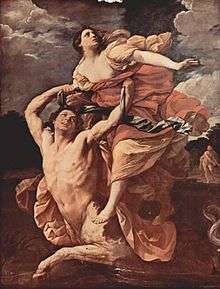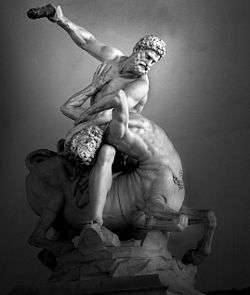Nessus (mythology)


In Greek mythology, Nessus (Ancient Greek: Νέσσος) was a famous centaur who was killed by Heracles, and whose tainted blood in turn killed Heracles. He was the son of Centauros. He fought in the battle with the Lapiths. He became a ferryman on the river Euenos.
Mythology
Nessus is known for his role in the story of the Tunic of Nessus. After carrying Deianeira, the wife of Heracles, across the river, he attempted to force himself upon her. Heracles saw this from across the river and shot a Hydra-poisoned arrow into Nessus's breast. As a final act of malice, Nessus told Deianeira, as he lay dying, that his blood would ensure that Heracles would be true to her forever.
Deianeira foolishly believed him. Later, when her trust began to wane because of Iole, she spread the centaur's blood on a robe and gave it to her husband. Heracles went to a gathering of heroes, where his passion got the better of him. Meanwhile, Deianeira accidentally spilled a portion of the centaur's blood onto the floor. To her horror, it began to fume by the light of the rising sun.
She instantly recognized it as poison and sent her messenger to warn Heracles but it was too late. Heracles lay dying slowly and painfully as the robe burned his skin—either in actual flames or by the heat of poison. He died a noble death on a funeral pyre of oak branches. Heracles was then taken to Mount Olympus by Zeus and welcomed among the gods for his heroic exploits. A similar theme appears in certain versions of the story of Medea.
Sophocles' play Trachiniae (Women of Trachis) is extensively based on a retelling of this myth.
References
Hercules rescues Meg from an alternate version of Nessus in the Disney movie, Hercules.
One of the main characters in Larry Niven's series of books from the Ringworld universe is called Nessus. He is of an alien race with body akin to horse's and two heads.
Bibliography
F. Diez de Velasco, "Nessos", Lexicon Iconographicum Mythologiae Classicae, Munich-Zurich, Artemis Verlag, vol. VI,1, 1992, 838-847 & VI,2, 1992, 534-555.
External links
| Wikimedia Commons has media related to Nessus. |